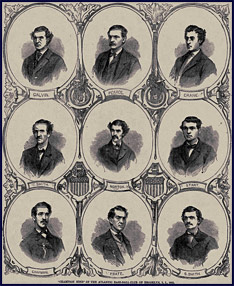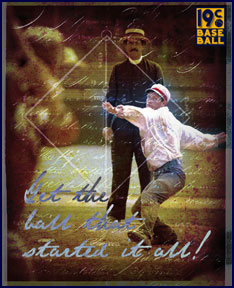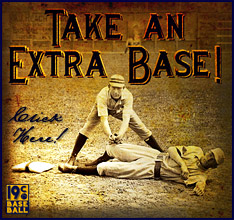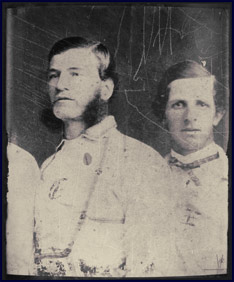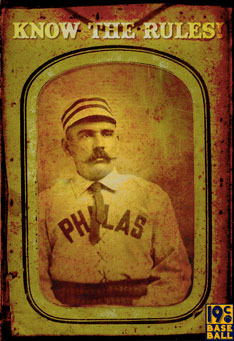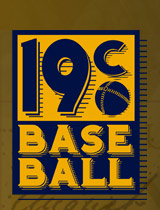Champions 1851–1859
By Eric Miklich

he claim of "Champion" prior to 1871 was completely subjective as no formal schedules, standings or rules existed to determine the best club. Generally during the season the two or three best nines would schedule three matches against each other. One match was played on each of the contesting clubs grounds and a third at a neutral site. The club winning two of three matches would anoint themselves the champion for that season. However, the lack of a formal process used in declaring a yearly champion and the inability of the New York and Brooklyn clubs and their local newspapers to recognize that other talented clubs existed outside of the "Mecca" of baseball, always resulted in the champion being chosen from New York or Brooklyn.
Although the number of baseball clubs forming each year since 1857 constantly grew, the end of the Civil War in May of 1865 allowed the country more time for leisure. As a result clubs formed at a rapid rate and began to schedule matches for the 1866 season. This number steadily increased in to the 1870's. Many of the established and more powerful clubs became aware of the monetary benefit of touring and did so during the year. As a result many of their matches were against these new and weaker nines, which were happy to feature their more skilled opponents and also gain financially from their presence. A distinction has been made in the listing of the yearly champion's won-lost record as to how they faired against "established" clubs and against weaker clubs, until the 1868 season. By 1869 most of the established clubs were playing over 50 matches a year and by 1870 many were playing over 70 matches a year.
PLEASE NOTE: The listing below is solely the opinion of 19c Base Ball and does not necessarily reflect the generally accepted champion for each year. In each such instance the difference is indicated. 19c Base Ball, unlike most newspaper accounts of the period, realizes that championship-caliber baseball teams did indeed exist beyond the borders of New York.
1851: KNICKERBOCKER CLUB
Although only two matches were reported on, both were won by the Knickerbocker Club. On June 3rd the Washington Club was defeated 21-11 and on June 17th, in 10 innings, the Washington Club lost 22-20. Scoring twenty-one runs in a match was the factor in deciding the winner until 1857.
1852: KNICKERBOCKER CLUB
The Washington Club became the Gotham Club of New York in 1852 and played two matches against the Knickerbockers. The scores of the matches are not reported but the Knickerbockers were victorious both times.
1853: KNICKERBOCKER CLUB
Won two matches convincingly over the Gotham Club of New York. On July 1st, at Elysian Fields (Hoboken, NJ) two full innings were concluded with the Knickerbockers leading 9-2. The match was completed on July 5th and the Knickerbockers won 21-12, in 9 innings. The return match was played on October 14th at the Red House Grounds (106 Street and Second Avenue, NY) and won by the Knickerbockers won 21-14.
1854: EAGLE CLUB OF NEW YORK
In their first year of existence the Eagle Club played only two matches and each time defeated the mighty Knickerbocker Club at Elysian Fields. The first victory came on November 10th by a score of 21-4, in which the match lasted five full innings. The second win for the Eagle Club came on November 17th, also in five innings, 22-21. The Gotham Club of New York finished 1-1-1 and the Knickerbockers, who played the most matches of the three clubs, ended the season 1-3-1.
1855: KNICKERBOCKER CLUB
The Knickerbockers overcame their first true losing season in 1854 by finished with a 3-1 mark. Even thought the Gotham Club of New York ended with a better record, 4-1, the clubs split their two matches during the year and the Knickerbockers allowed less runs. On June 1st, the Gotham Club won 21-12, in 11 innings, at the Red House Grounds and the Knickerbockers won the return match played at Elysian Fields on September 13th, 22-7 in 5 innings.
1856: GOTHAM CLUB OF NEW YORK
Over 20 Clubs, including junior clubs, were active during the 1856 season. The Gotham Club completed the season with a 4-1-1 record and finished 1-1-1 against the Eagle Club, the second best nine that season, allowing 15 less runs in those matches.
1857: GOTHAM CLUB OF NEW YORK
In March of 1857 the First Base Ball Convention was held and attended by 16 representatives of clubs from New York and Brooklyn. The rules were codified and a club scoring 21 runs no longer decided the victor. From this convention forward the club with the most runs after nine equal innings was the winner.
The Gotham Club ended the season 4-2, won two of three from the Eagle Club and split two games with the soon to be powerful Atlantic of Brooklyn Club. On September 3rd at the Capitoline Grounds, the Atlantic's home field, the Gotham Club was defeated 41-11, but won the second match, played at Elysian Fields (NJ) on October 30, 24-19.
1858: ATLANTIC OF BROOKLYN BBC
Five clubs had exceptional records at the conclusion of the 1858 season. The Mutual Club of New York finished 11-1 in their first full season, the Empire Club of New York ended at 8-1-1, the Eckford Club of Brooklyn finished 5-1 and the Excelsior Club of Brooklyn won eight and lost five. Only the Atlantic Club of Brooklyn was undefeated and five of its seven games were against established clubs. If not for a tie on September 22nd with Knickerbocker Club, who finished 0-3-1, the Empire Club would be considered the champion. Their only loss was a one run defeat to the Mutual Club on September 30th, 18-17, which they avenged on October 18th, 37-22. Six of the Empire Clubs matches were against established clubs.
The Atlantic Club defeated the Putnam Club and the Excelsior Club twice, each and never surrendered more than 17 runs in any match and never scored less than 17 runs in any match.
On July 8th the Excelsior Club defeated the Knickerbocker Club 31-13, at Carroll Park in Brooklyn. Harry Wright was the losing pitcher for the Knickerbockers.
A three game series was played at the Fashion Race Course on Long Island between all-stars teams from Brooklyn and New York. The first game is played on July 20th and for the first time admission, 10¢, is charged to watch the match. Reports estimate the attendance at over 10,000, but based on the gate receipts, $508.84, more likely a little over 5,000 people attend. John Henry Holder, a player with the Excelsiors (Brooklyn), hit the first home run ever recorded in a box score, but New York wins the game 22-18. On August 19th the second game of the series is played and Brooklyn beats a team of New York all-stars, 29-8. The final and match of the series is played on September 10th before several thousand spectators. The New York all-stars beat Brooklyn, 29-18. This series introduced Henry Chadwick to the newspaper-reading public, beginning a baseball reporting career that would last 50 years.
1859: ATLANTIC OF BROOKLYN BBC
The Atlantic Club of Brooklyn was one of five teams to post outstanding records in 1859. The Excelsior of Brooklyn ended the year at 12-3, The Eckford Club of Brooklyn finished 11-3, the surprising Star Club of Brooklyn won eight and lost only one and the Eagle Club of New York concluded at 6-3. The Atlantic Club's only loss was on September 8th to the Eckford Club, 22-16. The Atlantic's defeated the Eckfords on two other occasions, 25-15 on July 8th and 22-12 on October 12th, both played in Greenpoint (Brooklyn), The Atlantic's played eight of their 11 matches against established clubs.
The Knickerbocker Club played two "fly matches" with the Excelsior Club of Brooklyn on June 30th and August 2nd losing both 28-22 and 20-5, respectively. During these matches an out on a fair batted ball was recorded only when the ball was caught before hitting the ground. The Knickerbockers were strong proponents of this type of play and attempted to institute this rule at the 1857 Base Ball Convention.
*Accepted champion: Atlantic of Brooklyn BBC (11-1).
